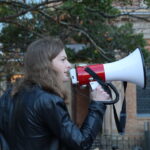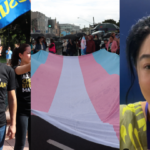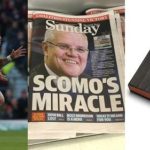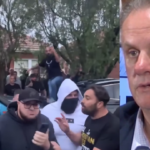A Truly Secular Australia Requires Vigilance, Asserts Secularism Australia’s Michael Dove
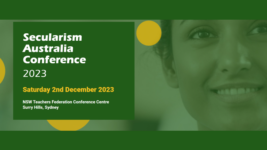
Secularism provides that there should be a separation of church and state, which means that those governing shouldn’t be swayed by any particular faith doctrine in drafting laws and policies. And this concept likewise requires that the state shouldn’t be intervening in citizens’ religious beliefs.
Most Australians consider this nation to operate in a secularist manner, and in many circumstances, this does appear to be the case. However, there’s no clear law explicitly requiring that faith doesn’t shape politics, and there are many trappings that link our multifaith society to the Christian Church.
The clearest hint that Christianity continues to underpin Australian government is that each session of federal, state and territory parliament is opened with the Lord’s Prayer. And despite moves by nonmajor party MPs to end this practice, the majors persist in resisting them.
Yet, with each passing Census, the number of respondents indicating that they have “no religion” is only growing, as are the numbers indicating a religion other than Christianity. And while those secularly-minded are casually watching this transpire, the Christian Right is fighting back.
Parliamentary crusaders
Former PM Scott Morrison said, during his 2008 maiden speech in parliament, that “Australia is not a secular country. It is a free country.” And despite many considering that there is a clear distinction between church and state, there is no statute or law to turn to in order to dispute this claim.
Indeed, a decade later, Morrison was appointed as the first Pentecostal PM of Australia. And as a key figure within the nation’s Christian Right, he set about prioritising the Religious Discrimination Bill, which, despite its title, aimed to uphold Christian rights and liberties above all others.
Morrison was still treasurer in December 2017, when he announced his religious freedoms crusade, just two weeks after the nation had legalised marriage equality. And so focused was the then PM on this mission, that he released the second draft of his bill during the height of the 2019 bushfire crisis.
The ex-PM is no lone wolf, either. As he was pursuing his religious laws, the annual Church and State Summit commenced its agenda, which involves extremist Christians discussing how to instil their beliefs into law, whilst the SA Liberals had to purge 150 Pentecostals, who’d infiltrated its ranks.
Fighting for separation
Morrison’s religious freedoms legislation fell over in the end, and his government’s reign did the same soon after.
But the Christian Right continues to meet at the annual Church and State Summit, and its goal of having the conservative values of its faith shape society remains alive and well.
The NSW state election of last March saw both NSW Labor and the Liberals propose a religious advisory council to parliament. And now the Minns government has taken the reins, it’s in the process of putting together the NSW Faith Affairs Council to provide advice to ministers on law.
Sydney Criminal Lawyers spoke to Michael Dove about the upcoming Secularism Australia Conference 2023, which he, as the organising chair, considers is a necessary addition to the public sphere to counter the rising Christian Right and its far-right affiliates attacks on democracy.
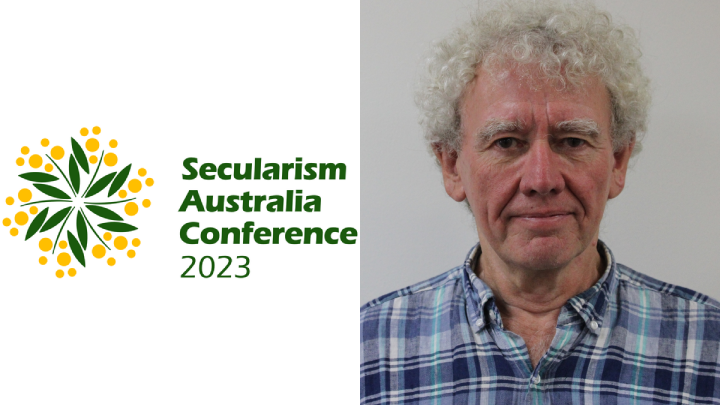
Firstly, Michael, the inaugural Secularism Australia Conference 2023 is being held in Sydney in early December.
The Morrison government’s time in office was distinctly marked by concerns about strengthening religious rights, but its religious freedoms agenda has come to an end.
So, why is it important to hold a conference on secularism now?
The reality is that Morrison was but one of a long line of religious parliamentarians. Religious parliamentarians are disproportionately represented in what is our principal lawmaking institution.
A high proportion of our parliamentarians certainly have religious beliefs or belong to the quieter undercurrent of more discrete religious believers and their influence can undermine the separation between church and state that, in theory, this country should be pursuing.
The religious lobby is well resourced and well organised. And that influence needs to be counterbalanced by the nonreligious.
The 2021 Census data indicates that almost 40 percent of us have no religion. And as Australia becomes more secularised the Religious Right is becoming more intrusive.
The conference is really an opportunity to set a vision of what a truly secular country looks like and to highlight some examples of why Australia is not a secular nation, as well as why secularism needs to be defended.
So, you’d say while the Morrison government’s Religious Freedoms Bill was shelved, the actual crusade isn’t over?
No. I don’t think it is. It was prominent for a few years, and there is still influence from it in every decision that’s taken in parliament.
So, the so-called religious agenda has subsided from the foreground, but it is just as likely to reemerge at some stage in the future.
As noted, a lot of Australians simply take it for granted that there’s a separation between church and state.
But what are some aspects of our democracy that people may simply assume are fundamental that could be threatened or altered by the influence of religion?
There are many aspects. The first one that comes to mind involves publicly-funded hospitals, which are often run by religious institutions that have policies that prevent universal access to things like reproductive care and end-of-life health services.
So, they’re not providing the universal services that you can get, or should be getting, at any public hospital.
Education is a large area where it impacts as well. I can think of three aspects to this. One is that there are huge amounts of largely unaccountable public funding going to religious schools.
Secondly, in many states, religious education is often used as a vehicle for encouraging particular views that are religious over other views. So, rather than a discussion of religions or philosophies, it becomes a form of religious instruction within the day’s curriculum.
The third area is what used to be called the National Schools Chaplaincy Program (NSCP), which is now called the National Student Wellbeing Program (NSWP).
Despite this name change and its new guidelines regarding the promotion of religion and proselytising, the program continues to provide a channel for influencing children and inculcating them with religious perspectives.
Even the name “chaplain” persists within the program, which reflects its longstanding association with Christianity. Chaplaincy invokes something to do with religion or church.
Chaplaincy Australia is still a major provider, and the chaplains on their books must demonstrate they are committed and active Christians. So, although there has been a change of name and guidelines, the supply lines are much the same for placing such individuals in schools and in identifying appropriate people.
And the training is still very much conditioned by the former chaplaincy model. So, education is a key area where we can see threats to a legitimate secularist approach.
There are also small symbolic encroachments in government at all levels: federal, state and some local. Prayers are still used at the beginning of most government business, and they give privileged exposure to essentially Christian rights.
Some local governments use a multifaith prayer. But research that I’ve done found that most of those who are still retaining a prayer, in Victoria at least, continue to begin proceedings with the Christian prayer, and that’s inappropriate, in my view.
There are other areas, such as care and the general funding of resources, all of which are really examples of the reasons why it is wrong to assume that there is this separate approach between church and state.
An attempt to stage a similar religious freedoms coup in NSW state parliament was launched by former NSW One Nation leader and atheist Mark Latham. But it withered away after the Morrison bill failed in federal parliament.
But both the NSW Liberals and NSW Labor ran in the March election on platforms that included establishing religious advisory bodies to state parliament. And the Minns government is now in the midst of putting together what is called the NSW Faith Affairs Council.
How do you consider this development?
As a passionate supporter of the Yes campaign, I am a supporter of voice for all the significant interest groups, and this most certainly extends to religion, particularly when they are valuable in some respect, in our pluralistic and multicultural society.
There is no doubt that religious people make brilliant contributions to society through their nonreligious activities, where there isn’t a preachy aspect or proselytising dimension to their advocacy.
But with the NSW Faith Affairs Council, it needs to be a genuine multifaith body. Its membership should be reflective of all faith groups, and those who have no faith.
The NSW Faith Affairs Council website indicates that the council membership will reflect the religious diversity of NSW.
And to this end, 12 of its 16 members “will be determined by a nomination and appointment process based on the most recent Census data relating to religious diversity in NSW”.
In NSW, pretty much one-third of respondents chose no religion in the Census. And on that basis, in my view, it would be discriminatory against the nonreligious if they didn’t have 4 seats out of the 12 that are going to be based on the Census data reserved for the nonreligious.
The religious council, as you say, will be a multifaith body. However, it will be advising a parliament that opens every session with the Lord’s Prayer.
So, do you think this could lead to bias in which religion’s advice is favoured?
The Lord’s Prayer has no place in any government meeting in a secular, multicultural and pluralist state. And following that, it is specifically biased as it’s a Christian prayer. It is particularly provocative and inappropriate.
The Rationalist Society of Australia has pointed out that Sydney Atheists’ Steve Marton has put his name down for the council, and he has church-backing, as the endorsement of a religious institution is a requirement of the council’s application process.
Do you think he stands a chance of making it onto the council?
I would hope so. Steve Marton would be an excellent representative and spokesperson for people who are not religious.
And as indicated, there is a case for discriminatory behaviour if he isn’t elected to the council, and likewise, it would be discriminatory if they don’t have a proportionate representation, as stated in the guidelines of recruitment for council members.
So, does he have a chance? Well, time will tell. But it will be a good indication as to where the NSW Labor government sits in relation to the direction that it wants this NSW Faith Affairs Council to go in and how representative it is.
The Secularism Australia Conference 2023 has an impressive lineup of speakers. Can you talk about who’ll be addressing the conference on the day and what those who attend can expect over the course of it?
The way we’re planning it is that the morning sessions are reflecting on the broader questions of secularism.
So, the day will start with presentations from former High Court Judge and longstanding advocate of secularism, despite his being a committed Anglican, Michael Kirby.
We will also be hearing from author Vanessa Badham and Australian Greens Senator David Shoebridge.
We will hear from former Reason Party leader Fiona Patten, who was a member of the Victorian Legislative Council until last year. And we’ll also hear from constitutional lawyer Luke Beck and researcher Chrys Stevenson.
So, they’ll be discussing the broader questions around secularism, at a time when there is an increasing tension between the growth of secularisation and the rise of the Christian Right.
They’ll share their perspectives. And in particular, Chrys Stevenson will be warning us of the hazards of sitting on our hands and doing nothing, and asking us to reflect on quite a few things we’ll find challenging.
In the afternoon, we will be shining a light on people who are doing the hard yards to challenge and promote secularism in a range of specific case studies, such as government, education, health, wellbeing or chaplaincy and in sectors, such as defence, prisons, schools, hospitals and aged care.
It will be much more about specific instances where the threats exist, and the work that’s being done to challenge these threats.
But the whole day is really about bringing a large section of likeminded people together to network about why Australia is not secular and to identify what needs to change for it to be promoted.
And lastly, those prominent public figures you’ve mentioned will be discussing their vision of a secular Australia.
So, Michael, can I end by asking you, what you envision a truly secular nation would look like? And what sort of changes need to happen in order to bring about this sort of society?
It’s one where there is freedom of religion and it’s one where there is freedom from religion. That is something that’s very important.
Whilst there’s been a lot of emphasis on the former over the last couple of years, there hasn’t been much attention given to the latter.
Freedom from religion is something that’s being neglected. And I’d like to think that both religious and nonreligious people would enjoy the support of non-discrimination laws.
The Morrison initiative was clearly and transparently about the freedom of religion. And I have no problem that people should not be discriminated against because they are religious. But similarly, people who are not religious should not be discriminated against.
That is part of my vision.
I also envisage that religious institutions would have no special privileges – particularly financial privileges.
They should be subject to employment laws in the same way that all other employers are.
And in that same way, taxpayer-funded schools and care providers need to display a positive commitment to secularism and an absence of religious content, influence and symbolism in the way in which they deliver services.
The first step is to raise public awareness about our country not being secular, and that this risks secular areas being undermined. So, that’s where the conference comes in.
And the second step is to encourage the establishment of a non-party parliamentary friends of secularism group to ensure that encroachments upon secularism are called out.
As for the speakers’ visions, to learn about those we’ll all have to turn up to the conference to hear what they’ve got to say.


